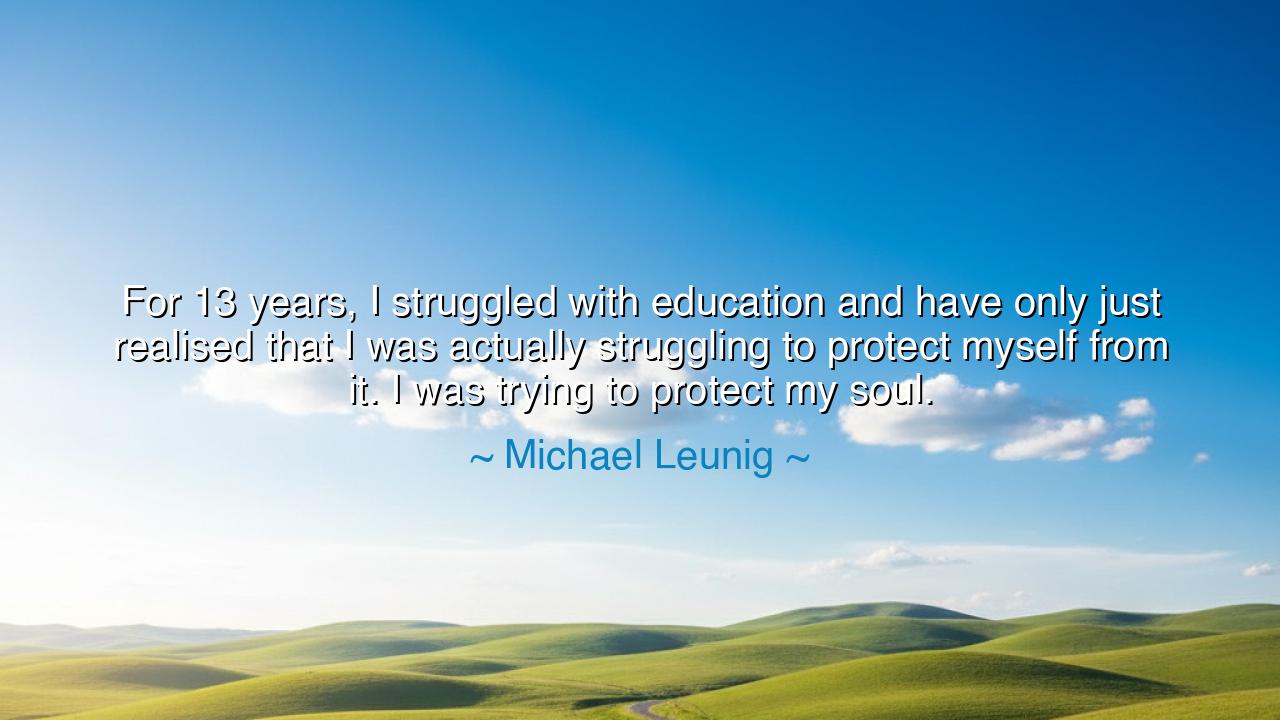
For 13 years, I struggled with education and have only just
For 13 years, I struggled with education and have only just realised that I was actually struggling to protect myself from it. I was trying to protect my soul.






The poet and philosopher Michael Leunig, a man whose art often speaks the language of the heart rather than the logic of the world, once confessed: “For 13 years, I struggled with education and have only just realised that I was actually struggling to protect myself from it. I was trying to protect my soul.” In this haunting reflection, Leunig reveals a wound that many have felt but few have named—the wound of a spirit bruised by a system that teaches the mind but forgets the heart. His struggle was not with learning itself, but with a form of education that sought to tame his imagination, to silence the voice of wonder within him. He fought not against knowledge, but against the mechanical schooling that threatened to strip him of innocence, creativity, and meaning.
To understand these words, one must look beyond the walls of the classroom and into the nature of the human spirit. The soul, that sacred and untamed force within us, is like a wild bird—beautiful, curious, and free. True education should help it soar higher, showing it new skies of understanding. But when education becomes rigid, when it prizes obedience over curiosity, when it rewards memorization over insight, it builds cages instead of wings. Leunig’s struggle, then, was the cry of a soul resisting imprisonment—a quiet rebellion against the slow suffocation of wonder.
In his own life, Leunig’s path was that of the artist, the dreamer who listens to the whispers of truth in ordinary things. Born in Australia, he grew up amidst simplicity and solitude, where the silence of nature and the innocence of childhood nourished his spirit. When he entered formal schooling, he found not the beauty of discovery, but the coldness of conformity. The lessons were precise, the rules relentless. He sensed that the more he conformed, the less of himself remained. And so, in his youthful confusion, he fought—not out of laziness, but out of instinct. For deep within him, a voice cried, “Protect your soul.”
History too offers echoes of Leunig’s lament. The story of Vincent van Gogh comes to mind—the painter who was once dismissed by his teachers as talentless and erratic. The schools of art could not see the fire that burned within him, for it did not fit their form. His education scorned him, yet his soul refused to be extinguished. He walked away from institutions to learn from fields, skies, and the faces of peasants. In solitude and suffering, he found truth through feeling rather than formula. Van Gogh, like Leunig, protected his soul from the kind of education that kills by kindness—by forcing the heart to obey the mind.
Leunig’s words are not a condemnation of learning, but a plea for balance. He does not reject education, but he warns against education that forgets its higher purpose—to awaken, not to numb; to expand, not to reduce; to humanize, not to mechanize. True education must speak to the soul as much as to the intellect. It must teach compassion alongside calculus, humility alongside history, and joy alongside judgment. For when the intellect grows but the spirit withers, the person becomes clever but empty—capable of building machines, yet unable to build meaning.
And so the struggle Leunig describes is not unique to him—it is the struggle of every child whose imagination is forced into the narrow mold of usefulness, every poet told to be practical, every dreamer told to grow up. It is the tension between what the world demands and what the heart knows to be true. When a child draws upon a wall or asks questions without answers, that is not ignorance—it is the language of the soul. To silence that is to cut the roots of wisdom itself.
The lesson, then, is both gentle and profound: Guard your soul, even in the house of learning. Seek knowledge, but let it serve your humanity, not enslave it. When you study, do not let your curiosity die in the shadow of authority. Learn not only from teachers, but from rivers, music, solitude, and sorrow. Read books, yes—but also read the sky, the laughter of children, the silence of dawn. For true education is not about information—it is about transformation. It is the harmony of mind and soul, reason and reverence.
Therefore, my friends, let us remember Leunig’s quiet rebellion—not as a rejection of learning, but as a call to redeem it. Let us build schools that awaken wonder, that nurture imagination, that treat the soul as sacred. For knowledge without spirit is hollow, and achievement without meaning is dust. In the end, the greatest wisdom is not learned—it is remembered. It is the rediscovery of the divine spark within, which no system, no doctrine, and no test can contain. Protect it well, for it is the light by which you will truly learn to live.






AAdministratorAdministrator
Welcome, honored guests. Please leave a comment, we will respond soon